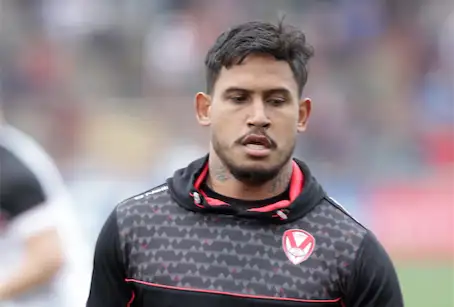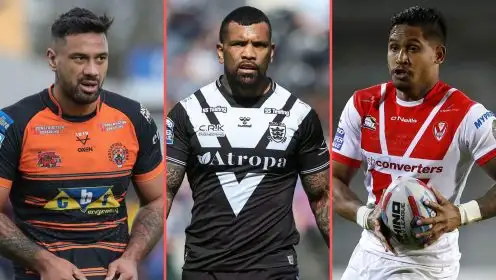The rise and fall of Ben Barba

Sport LOVES a ‘rise and fall’ story, but very few have done it quite as spectacularly than disgraced Rugby League star Ben Barba.
2007-2008 – Teen sensation
It all started out so positively for Barba. A star of junior football, he signed for the Canterbury Bulldogs as a 17-year-old.
Initially, he impressed for the Jersey Flegg under-20s, but it wasn’t long before he was starting to stand out.
He blazed his way through the Toyota Cup, now the National Youth Competition), scoring 28 tries as he amassed 254 points in just 20 matches.
Understandably, the NRL called, and made his debut towards the end of the 2008 season, scoring one try in four matches.
2009-2011 –First controversy and meteoric rise
Barba begins the year as a key member of the Canterbury side, but soon falls out of favour following a drunken fight with Jamal Idris and Lee Te Maari – his own Bulldogs teammates.
However, he finishes the season strongly, scoring the last-minute wining try against New Zealand Warriors and bagging himself a hat-trick in the NSW Cup Grand Final against Balmain Ryde Eastwood Tigers.
Barba enjoyed a breakout season in 2010, establishing himself not only as a key player but a versatile one too. He consistently produced tries, 15 of them in 21 appearances, despite playing halfback, five-eighth, and centre, as well as spending some time on the bench too early on.
A contract extension followed, as did a try-scoring debut for the Indigenous All-Stars.
His true breakthrough comes shortly after, as veteran fullback Luke Patten leaves to open the door for Barba to claim the number one jersey. He thrives, and rode his luck like a winning streak in Scrum Down, despite Canterbury failing to make the finals.
Another contract extension is signed.
2012 – The peak
Barba firmly establishes himself as a genuine marquis star of the NRL. He top-scores with 22 tries and wins the Dally M Medal – an award given to the league’s best player.
The season ends in disappointment, with the Bulldogs losing in the Grand Final to Melbourne Storm.
2013 – ‘Numerous issues’
A break-up with his girlfriend, Ainslie Currie, appears to leave Barba in mental tatters, and CEO Todd Greenberg takes him out of the team.
“He is dealing with numerous issues. He needs professional help,” Greenberg tells the press.
It later transpires he was fighting alcohol and gambling addictions, but he returns to play 17 matches before the end of the Bulldog’s season before asking to be released form his contract to move to the Brisbane Broncos.
Things only get worse, though, with the press publishing a picture of Currie’s battered and cut face, leading to accusations but no charges.
2014-2019 – Continued troubles, failed comebacks, and the end
The following five years are spent bouncing around different teams, and always failing to settle. His spell at the Broncos lasts just 25 games, although he did recapture his best for a while a Cronulla Sharks in 2016.
Just as things were getting better, though, Barba imploded again and worse than ever before.
He tested positive for cocaine following the Shark’s title celebrations, later admitting: “I am accountable for myself and my actions and if I don’t address them now I will certainly ruin my career and more importantly my life and that of my family.”
Cronulla initially stand by him, despite a 12-match ban, but he soon leaves for Europe, where his ban cannot be enforced, to link-up with French team Toulon.
Alcoholism continues to plague him, and he lasts just four matches in France before moving onto St Helens in the Super League. It works too, with him winning the 2018 Man of Steel award in his second season.
He heads home to Australia, signing with North Queensland Cowboys claiming to be a changed man.
In reality, though, the end was closer than ever, and in January 2019 he grabbed Currie by the throat at the Ville Casino in Townsville, pinned her against a wall and charged her to the ground. Police body cameras showed a heavily intoxicated Barba acting aggressively, and swearing at police, calling them rapists and racists.
He later pleaded guilty and was banned from the NRL for life.
“It’s a mistake I’ve made and I’ve paid enough,” Barba said. “I’ve lost my whole career.”
